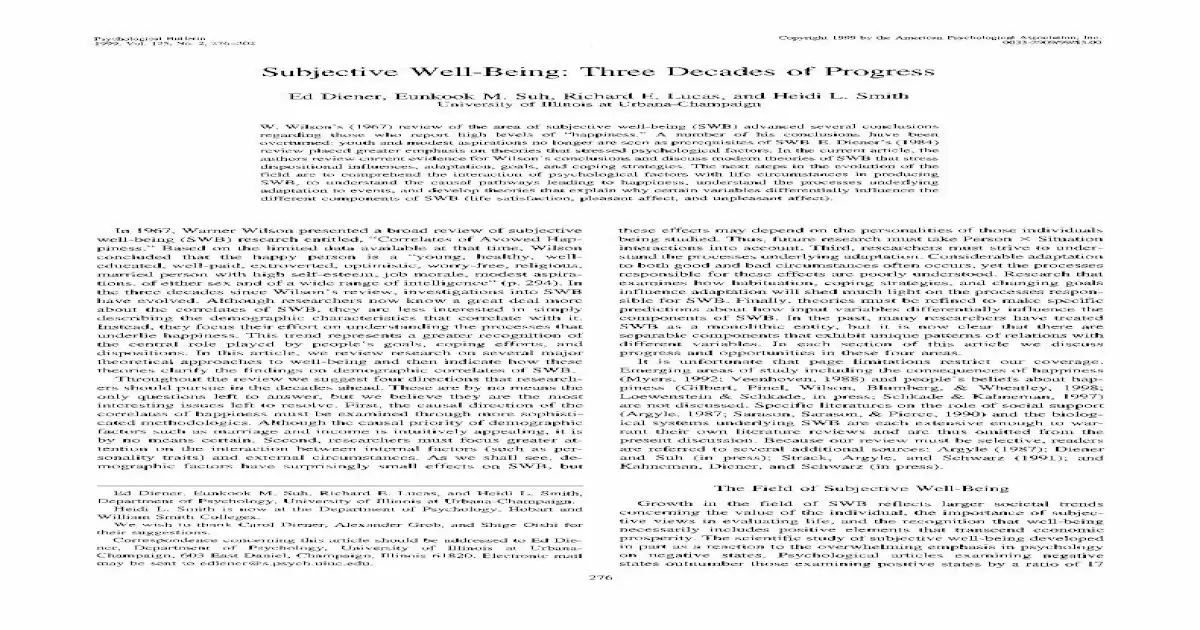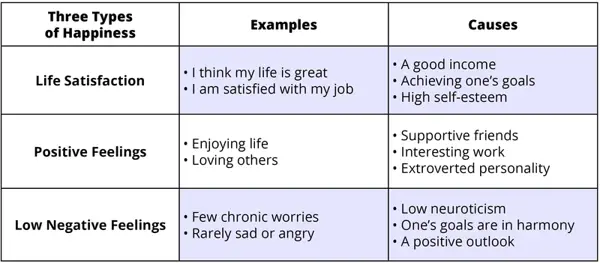Table of Contents
- What is Subjective Well-Being?
- Diener's Definition
- Factors Influencing Subjective Well-Being
- Measuring Subjective Well-Being
- Importance of Subjective Well-Being
- Improving Subjective Well-Being
- Conclusion
What is Subjective Well-Being?
Subjective well-being refers to how people experience and evaluate their lives, including emotional states, life satisfaction, and overall well-being. It encompasses both positive and negative aspects of life satisfaction and happiness.
Diener's Definition
Psychologist Ed Diener defines subjective well-being as "a person's cognitive and affective evaluations of his or her life." He emphasizes the importance of subjective perceptions and individual experiences in determining well-being.
Diener's definition of subjective well-being focuses on individuals' evaluations and perceptions of their own lives. It includes three components: life satisfaction, positive emotions, and negative emotions.
Life satisfaction refers to an overall assessment of how satisfied one is with their life as a whole. Positive emotions involve feelings of happiness, joy, and contentment, while negative emotions encompass feelings of sadness, anger, and stress.
According to Diener, subjective well-being is influenced by a variety of factors, including genetics, personality traits, life circumstances, and cultural influences. Overall, Diener's definition emphasizes the importance of how individuals subjectively experience and evaluate their own lives in determining their well-being.

Factors Influencing Subjective Well-Being
Various factors can influence subjective well-being, including genetic predispositions, personality traits, social relationships, socioeconomic status, and cultural factors. Personal values and life events also play a significant role in determining well-being.
Subjective well-being refers to how individuals evaluate and experience their lives in terms of satisfaction and happiness. According to Diener, a prominent psychologist, there are several factors that influence subjective well-being:
- Genetic factors
- Personality traits
- Physical health
- Social relationships
- Financial stability
- Work and career satisfaction
- Sense of purpose and meaning in life
By understanding and considering these factors, individuals can improve their subjective well-being and overall quality of life.

Measuring Subjective Well-Being
Subjective well-being can be measured using self-report questionnaires, such as the Satisfaction with Life Scale and the Positive and Negative Affect Schedule. These measures assess different aspects of well-being, including life satisfaction, positive emotions, and negative emotions.
Subjective well-being is a term used to describe an individual's overall satisfaction with their life and their emotional state. It is a subjective measure that is based on a person's own evaluation of their well-being, rather than objective factors such as income or social status.
One prominent researcher in the field of subjective well-being is Ed Diener. Diener has developed several methods for measuring subjective well-being, including self-report surveys and experience sampling techniques. These measures assess various components of well-being, such as life satisfaction, positive emotions, and negative emotions.
Measuring subjective well-being is important because it provides valuable information about people's quality of life and happiness. By understanding what contributes to subjective well-being, researchers and policymakers can develop strategies to enhance people's overall well-being and improve their quality of life.
In conclusion, subjective well-being is a key aspect of a person's life and can be measured through various methods developed by researchers like Ed Diener. Understanding and improving subjective well-being is essential for promoting individual happiness and well-being.

Importance of Subjective Well-Being
Subjective well-being is important for overall health and happiness. Research has shown that individuals with higher levels of well-being are more likely to have better physical health, stronger relationships, and greater resilience to stress and adversity.
Subjective well-being refers to an individual's overall emotional and cognitive evaluation of their own life. It encompasses both positive and negative emotions, life satisfaction, and overall well-being. According to Diener, a pioneer in the field of positive psychology, subjective well-being is crucial for individual happiness and overall quality of life.
Diener's research has shown that individuals with higher levels of subjective well-being tend to have better physical health, stronger social relationships, and higher levels of productivity. They also tend to experience less stress and depression, and have a greater sense of purpose and meaning in their lives.
Overall, understanding and promoting subjective well-being is essential for creating a more positive and fulfilling life for individuals. It is a key component of overall well-being and should be prioritized in both personal and societal contexts.

Improving Subjective Well-Being
There are various strategies for improving subjective well-being, including practicing gratitude, cultivating positive relationships, engaging in meaningful activities, and adopting a positive mindset. Regular exercise, mindfulness, and self-care also contribute to well-being.
Improving Subjective Well-Being in the subjective well-being definition by Diener involves focusing on individuals' overall life satisfaction, positive emotions, and sense of purpose. By fostering positive relationships, engaging in activities that bring joy and fulfillment, and practicing gratitude and mindfulness, individuals can enhance their subjective well-being. It is important to prioritize self-care, seek support from loved ones, and make conscious efforts to cultivate a positive mindset. Ultimately, by taking proactive steps to improve subjective well-being, individuals can experience greater happiness and fulfillment in their lives.

Conclusion
Understanding subjective well-being is crucial for promoting happiness and overall well-being. By considering individual perceptions and experiences, we can enhance our quality of life and strive for a more fulfilling existence.
Key Takeaways
- Subjective well-being involves cognitive and affective evaluations of life.
- Factors influencing well-being include genetics, personality, and social relationships.
- Measuring well-being can be done through self-report questionnaires.
- Improving well-being involves gratitude, positive relationships, and mindfulness.
FAQ
What is the difference between subjective well-being and objective well-being?
Subjective well-being focuses on individuals' personal evaluations of their lives, while objective well-being measures external factors such as income and health.



Recent Comments